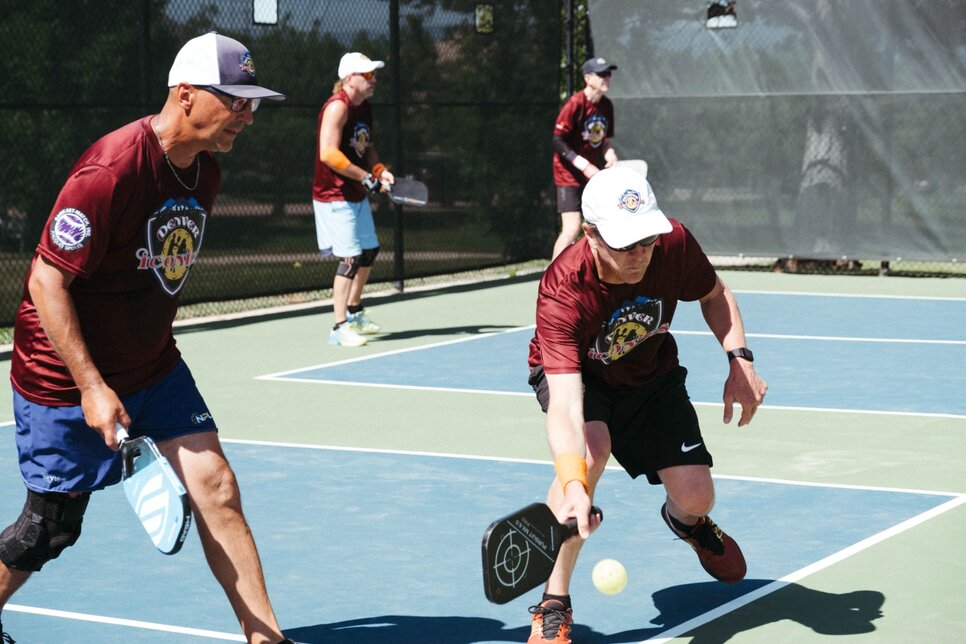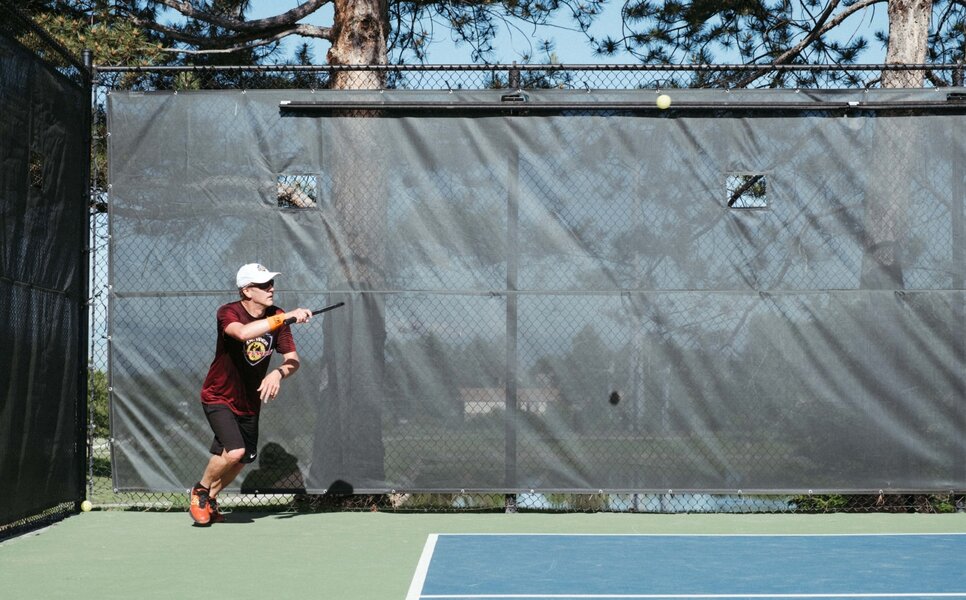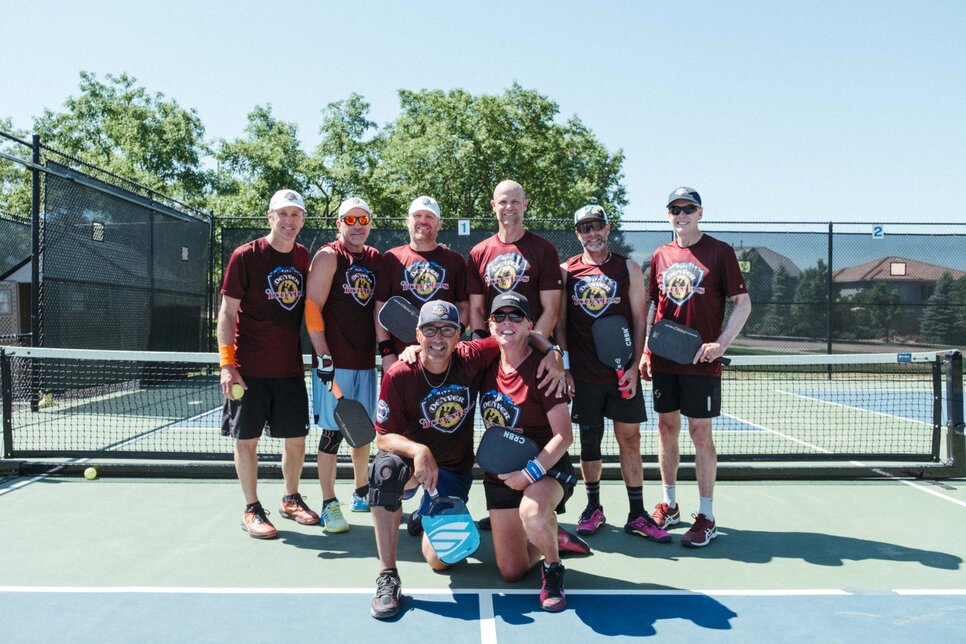Your professional pickleballers: The Denver Iconics
share

DENVER — As the Colorado Avalanche and the Denver Nuggets fade away from disappointing postseason runs and the Colorado Rockies battle for the worst record in baseball, Colorado sports fans are on the hunt for a new team to support.
Enter the Denver Iconics, Denver’s professional pickleball team, whose elite athletes ages 50+ are enjoying early season success along with the status of competing of being one of Colorado’s newest professional sports franchises.
Denver Iconics co-owner and player Mario Boschi wants to set one thing straight right off the bat,or more appropriately, the paddle:
“Yeah, no, it’s a real sport,” he said.
Boschi founded the team with Chris Montgomery, a professional pickleball player competing independently in Steamboat Springs. The team consists of fourteen players, seven women and seven men, ranging from Denverites to Californians to Floridians.
They play in same and mixed-gender pairs (which can be decided as quickly as the day of), often rotating between multiple partners in a tournament.
The majority of the team is unpaid. Only top prospects can hope to see a small salary. However, Boschi and Montgomery hope that as the league expands, viewership, sponsorships and revenue will expand accordingly.
“From an economic perspective, sports are tough. We’re going to be investing into the league for a long time,” said Montgomery. “But there’s so many people who want to come out and support the league… so we’re here to grow it.”
In order to be considered a “professional,” according to Boschi, one must have participated in some professional tournaments, like those hosted by Association of Pickleball Players (APP). While there are a number of such tournaments for younger competitors, there were none designated for older age groups.
Montgomery had become friendly with a few regular, professional opponents, and when a few began floating the idea of starting a national pickleball league, Montgomery raised his paddle.

Boschi (left) and Montgomery (right) are co-owners and players on the Denver Iconics, along with their wives, Jen and Amanda.
Photo: Peter Vo, Rocky Mountain PBS
“Pickleball has been the fastest growing sport in the country, and now in the world,” said Mongtomery, “so just a chance to be involved, be an owner… it’s a lot of fun.”
According to a 2024 Sport and Fitness Industry Association report, pickleball has been the fastest growing sport in the United States for the past three years, with participation increasing by 223.5% since 2021.
For those unfamiliar with the sport, pickleball is what Boschi described as a mix between tennis and ping pong. Two or four players playing on a doubles badminton-sized court (somewhat resembling a shrunken tennis court) knock a large wiffle ball back and forth using large plastic paddles. Much like tennis, ping pong or badminton, the goal is to hit the ball into the opponent’s zone without it being returned.
The sport is said to have originated on Bainbridge Island (a small island near Seattle, Washington) where a bored group of families, including then congressman Joel Pritchard, used a spare badminton court, badminton rackets and a perforated plastic ball to play an enlarged game of ping pong.
Pritchard allegedly dubbed the sport “pickle ball” in reference to, “the thrown-together left-over non-starters in a ‘pickle boat’ of crew races,” according to USA Pickleball.
Pickleball’s expansion has been so sweeping — there are nearly 14,000 courts nationwide, according to Pickleheads — that many tennis courts are being repurposed into pickleball courts, much to the chagrin of many tennis players.
The sport prides itself on being easily accessible for a variety of players, though it has developed a reputation for catering to slightly older athletes.
However, recent reports have found that younger players (ages 18 – 34) make up the majority of nationwide participants, a major contributing factor to pickleball’s overall growth.
“People [think] pickleball is for the elderly… but in the last ten years, the young generation has taken over,” said Boschi. “And it is very competitive.”
There are a variety of professional pickleball tournaments across the nation, and prodigious picklers aged 18 and younger can now compete in the USA Pickleball Juniors.
Yet, despite the sport’s reputation, there was no professional league for players over the age of fifty until 2022, when three professional pickleballers united to form the National Pickleball League.
“This is the first senior pro league in the country,” said Montgomery, “We’ve got all of the top players in the country coming to the same place.”
“If you want to see the best of the best players, this is the place to do it.”

Scott Johnston, a Utah-based pickler in his first season with the Iconics, winds up for a serve.
Photo: Peter Vo, Rocky Mountain PBS
According to Boschi and Montgomery, the top rated pickleball players – the women and men who have made a name for themselves in tournament-level pickleball – are signed before the draft.
Others looking to join a team are drafted out of the pickleball combines, intense tryouts hosted in Florida and Texas where more than 100 aspiring picklers play rotation games in front of team scouts.
Montgomery noted that regardless of whether a player is drafted or not, the combine offers older athletes a rejuvenating sense of athleticism and accomplishment.
“It’s a chance to be drafted by a professional team,” said Montgomery. “That’s a pretty fun thing for a grown up.”
The league’s inaugural 2023 season began with six teams: the Indy (Indianapolis) Drivers, the Austin Ignite, the Boca Raton Picklers, the Naples JBB United, the Oklahoma City Punishers and the Denver Iconics.
This year, the league has doubled in size to now include: the Coachella Valley Scorpions, Seattle United Pickleball, the Princeton Bruisers, the Kansas City Stingers, the Houston Hammers and the Columbus Hotshots.
The season consists of five tournaments and a final championship, all scattered across the country. Players only compete in doubles, never singles: men’s, women’s and mixed.

Based in Steamboat Springs, Montgomery has played pickleball for more than 10 years.
Photo: Peter Vo, Rocky Mountain PBS
The Indy Drivers won the first National Pickleball Leaugre Championship last year after a competitive seven of eight match series against the regular-season champions, the Austin Ignite.
Despite a less-than-ideal debut last year, both Boschi and Montgomery are excited for Season 2, thanks in part to a strong mix of new and returning elite picklers.
Molly Carter, a life-long tennis player who grew up training with the Bryan brothers (a successful pair of identical twin doubles players), took a break from the sport after having kids. She first tried pickleball at a friend’s birthday party and has been hooked ever since.
“We had so much fun,” said Carter. “We just kept doing it, and the next thing I knew, I wasn’t playing tennis anymore. I was playing pickle.”
Carter is joining the Iconics in her first season of eligibility when she turns 50 in August. The prospect of playing professional pickleball made getting older something for Carter to anticipate.
“If you would have asked me when I was 45, ‘Are you excited to turn 50?’ I would have been like, ‘Oh my God, no, like, stop,’” said Carter. “But I have been counting down the months until I turn 50.”
Danny Wuerffel, another Division I athlete turned-pickleballer, echoed the reinvigorating effects of the sport.
“Turning 50 in general is not always the [greatest] experience in life,” said Wuerffel. “But if you’re a pickleball player, it’s like a new lease on life.”
“It’s fun turning 50 in pickleball.”
Before joining the Iconics, Wuerffel was a star quarterback at the University of Florida, where he led the Gators to four straight SEC championships. He won the Heisman Trophy, among others, for his efforts, and earned a spot in the NFL, where he played on a number of teams until retiring in 2004.

The 2024 Denver Iconics.
Photo: Peter Vo, Rocky Mountain PBS
Wuerffel was an early adopter of pickleball, crediting the sport with inspiring “real competitive juices” in a way that other casual athletics had not. He likened both the agility and the strategy of pickleball to that of a quarterback, where you must be on your toes both literally and mentally at all times.
Competitive juices aside, Wuerffel underlined the accessibility and versatility of pickleball as well.
“There’s few sports that you can enjoy the first day you play and forever,” said Huerffel. “Old people, young people, men and women, great athletes, not as good athletes… and it progresses to be still engaging for some of the best athletes in the world.”
Both Carter and Huerffel are looking forward to a strong season which got off to a promising start at the team’s first tournament in Chicago, where they went 3 – 1. They are currently in sixth place, tight on the tails of the Coachella Valley Scorpions and the Boca Raton Picklers.
Those interested in following the Iconics can find them on Pickleball TV and the Pickleball Channel, as well as through their social media pages.
And to those interested in getting on the court, Carter assures that the welcoming and quickly growing pickleball community is always looking to foster new talent.
“If you’re new… don’t be intimidated. People will help you,” said Carter. “They’re excited to have new players in the sport, which is, I think, unique to pickleball.”